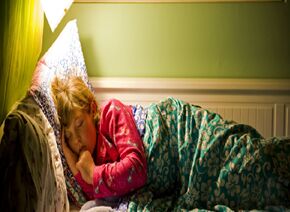晚上开灯睡的人更容易胖,特别是女性!
Keeping a lot of light on while you snooze — such as from a television or bright nightlight — has been linked with an increased risk of weight gain and obesity.
睡觉时开着大量的灯——比如看电视或开着明亮的夜灯——会增加体重增加和肥胖的风险。
Specifically, sleeping with a television or light on in the room was positively associated with gaining five kilograms, or 11 pounds, over a five-year period among women in a new study published in the medical journal JAMA Internal Medicine on Monday.
周一,医学杂志《美国医学会内科杂志》(JAMA Internal Medicine)上发表的一项新研究表明,在5年的时间里,在房间里看电视或开灯睡觉与女性增重5公斤(合11磅)呈正相关。

"There was a 17% chance of gaining the five kilograms — after we adjusted for confounding factors," said Dale Sandler, a senior investigator at the National Institute of Environmental Health Sciences in North Carolina and senior author of the study.
北卡罗莱纳国家环境健康科学研究所的高级研究员、该研究的资深作者戴尔·桑德勒说:“在我们对混杂因素进行调整后,增加5公斤体重的几率为17%。”
In addition, there was a 22% chance of becoming overweight and a 33% chance of becoming obese, she added.
她补充:“此外,有22%的几率超重,有33%的几率会肥胖。”
Obesity means having too much body fat and overweight means weighing too much, according to the US National Library of Medicine. Both overweight and obesity are based on your body mass index but "obese" generally means having a much higher BMI.
美国国家医学图书馆称,肥胖意味着身体脂肪过多,超重意味着体重过重。超重和肥胖都是基于你的体重指数,但“肥胖”通常意味着有一个更高的BMI。
"We are in the middle of an obesity epidemic in the United States and the things that we usually think about for obesity prevention are hard for people to do — eat a better diet, get more exercise — and we don't seem to be making a dent," Sandler said. "If these study findings are true and if they can be replicated then it's a very easy public health message to turn off the lights when you're sleeping."
桑德勒说:“我们正处在美国肥胖流行的风口上,而我们通常认为的预防肥胖的措施对人们来说很难做到——吃更好的饮食,多做运动——而我们似乎并没有取得任何进展。”“如果这些研究结果是正确的,如果它们可以被复制,那么在你睡觉的时候关灯是一个非常简单的公共健康信息。”